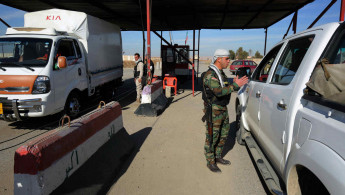Iran-backed militia lays siege to Iraqi village
The village of al-Mukhaysa, in the east of the Iraqi province of Diyala, is on the verge of a disaster, after being cut off by a siege enforced by militias.
The Shia-dominated, Iran-backed Popular Mobilisation Forces have cut off the roads and prevented the arrival of food and medicine to the town, in what has been described by locals as an attempt "to force demographic change".
"The militia factions have besieged the village for 20 days, cutting off all roads. The reasons and motives for the siege is not known, and people will die due to lack of food and medicine," a provincial official told The New Arab.
"Local officials have applied pressure to lift the siege on the village, but the miltias and the political parties who back them refuse to do so," he said. He added that the continuation of the siege threatens a "humanitarian disaster in the town".
Raad al-Dahlikia, the province's member of parliament, agreed.
"Political forces have been sending reassuring messages, but there are still parties working to destabilise the internal security of Iraq, and what is happening in the village of al-Mukhaysa shows it may join Basra in a new spiral of violence," he said.
Twitter Post
|
Over the weekend activists in the southern Iraq province of Basra described a campaign of intimidation and arbitrary detentions by powerful Iran-backed Shia militias and political groups that control the city, which has recently been rocked by protests.
Back in Diyala, Al-Dahlikia said the militias were threatening to kill any citizen leaving the village for supplies, despite the presence of state security forces.
"They suffer from deprivation and destitution," he said, warning the situation in the village was at risk of "exploding" if residents were influenced by the events in Basra.
"We used to hold terrorists of al-Qaeda and Daesh [the Islamic State group] responsible for taking away the security of our citizens... but the murder and kidnapping and the besieging of citizens continues," the MP said.
Diyala province's mixed demographics of Sunni, Shia and Kurdish Iraqis withstood the sectarian violence which followed the invasion of Iraq in 2003, and mixed marriage is not uncommon.
However, following the town's capture by the Islamic State group - and its subsequent recapture with the help of the Popular Mobilisation Forces in 2014, sectarian violence has risen.
After the main bulk of the fighting died down, militias reportedly prevented the majority of the 150,000 displaced former residents - predominantly Sunni families - from returning to their homes in the area.
The situation further escalated when militias carried out "revenge attacks" in Diyala after a suicide bomb killed at least 60 people in the province.
Twitter Post
|
Al-Dahlikia said he was surprised by "the silence of the government on what is happening in the province", and called on the speaker of parliament to place events in Diyala on the parliamentary agenda, concluding that militias in the area should be outlawed.
Villagers in the area said the militias were hoping to eventually displace them, bringing about a "demographic change" in the village.
"The militias only open the way out of the village for people carrying all their belongings, warning them against ever returning, while they prevent people from entering," said a local elder.
"At least nine people have been killed during the past few days, because they tried to enter the village through back roads to deliver food for family members," he said, adding that food was running out and there were no medical supplies in the village. He called on the government and authorities to "intervene to save the village before it is too late".
The PMF largely have control in Diyala, which is bordered by Iran - who many accuse of having a sectarian agenda in Iraq.
Militias played an important role in the fight against IS in Iraq, however they were subsequently condemned for human rights abuses against the civilian population.
Follow us on Twitter: @The_NewArab



